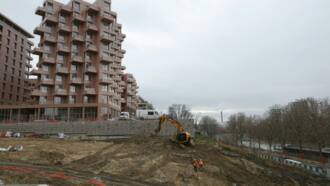[ad_1]

Photograph: Jaafar ASHTIYEH / AFP
Supply: AFP
Within the occupied West Financial institution, Hafeth Ghazawneh waits in quiet frustration for patrons to go to his falafel stall, which has been abandoned for the reason that October 7 Hamas assaults in Israel.
His breakfast and lunch choices had been fashionable with craftsmen from workshops close to Al-Bireh, the dual metropolis of Ramallah, earlier than the Israel-Hamas conflict broke out.
“Now they’re bringing their meals from dwelling as a result of the state of affairs is so troublesome,” Ghazawneh tells AFP, fearing he must shut up store if the conflict within the Gaza Strip continues.
Ghazawneh says his revenue has plummeted from round 7,000 shekels ($1,850) per 30 days to simply 2,000 ($530).
His worsening state of affairs displays the present standing of the West Financial institution economic system, which is in tatters because the conflict in Gaza rages.
The battle erupted after Hamas militants attacked southern Israel on October 7, ensuing within the deaths of round 1,140 individuals in Israel, largely civilians, in keeping with an AFP tally primarily based on the most recent Israeli figures.
Israel’s blistering retaliation has killed not less than 24,448 individuals, round 70 % of them ladies, kids and adolescents, in keeping with the Hamas authorities’s well being ministry in Gaza.

Photograph: Jaafar ASHTIYEH / AFP
Supply: AFP
The World Financial institution has estimated the West Financial institution’s GDP may fall by six % this 12 months, whereas the Worldwide Labour Group mentioned 32 % of jobs have already been misplaced.
The unemployment fee has skyrocketed to 30 %, up from 14 % earlier than the conflict, in keeping with Taher al-Labadi, a researcher on the French Institute for the Close to East (Ifpo).
Ballooning losses
Israel has additionally withdrawn 130,000 work permits from Palestinians within the West Financial institution, leaving many with no supply of revenue.
The three million Palestinians residing within the West Financial institution, which Israel has occupied since 1967, can not journey to Israel and not using a allow.
Bishara Jubran, supervisor of a family merchandise and cosmetics manufacturing unit in Ramallah, considers himself fortunate as a result of he has been capable of hold all 70 of his workers on the books.

Photograph: Jaafar ASHTIYEH / AFP
Supply: AFP
However his enterprise has stopped producing soaps comprised of Useless Sea substances which he used to promote to lodges.
Because the conflict rages and guests keep away, he estimates his losses at $200,000 final 12 months.
He retains his manufacturing unit afloat by promoting washing powder and different family merchandise on the Palestinian market.
However none of his items are allowed into Gaza, a key market that used to make up 20 % of his gross sales.
Within the West Financial institution, transport prices have elevated due to a rising variety of checkpoints and the sealing off of sure cities by the Israeli military, Bishara says.
“Many instances the truck leaves and it takes them like 4 or 5 hours to succeed in… the north in Nablus to seek out out that he can not enter the town. So he simply comes again,” he says.
Now he makes a supply each two or three days, down from two a day earlier than the conflict.
Such components have led to a contraction of the economic system, which is now working at 50 % of its capability, in keeping with Abdo Idris, president of the Palestinian Chamber of Commerce.
Economic system ‘asphyxiated’

Photograph: Jaafar ASHTIYEH / AFP
Supply: AFP
The Palestinian economic system was already “asphyxiated” and extremely depending on Israel earlier than the conflict, researcher Labadi says.
Underneath the Oslo Accords of the Nineties, it was agreed {that a} political establishment can be maintained and Palestinians had been promised financial growth.
However this establishment was undermined by Israel’s “colonisation of the West Financial institution”, Labadi says, lamenting that Palestinian financial growth “didn’t happen”.
Consequently, in instances of disaster, the more and more fragile Palestinian economic system finds itself “disadvantaged of all its assets and with a really restricted capability for resilience”, he says.
Israel controls the borders of the West Financial institution and collects taxes on Palestinian merchandise, which it should then cross on to the Palestinian Authority.
However since October 7, these taxes haven’t been paid.
As of December, Israel had not paid two billion shekels in taxes imposed on Palestinian merchandise, in keeping with the Palestinian finance ministry.
The Palestinian Authority has struggled to pay public servants for the reason that taxes had been withheld.

Photograph: Jaafar ASHTIYEH / AFP
Supply: AFP
Civil servants informed AFP their salaries for December have nonetheless not been paid.
In October, they obtained 50 % of their wages, and 65 % in November.
“The worry of the unknown is killing us,” Jubran says. “We do not know if we’ll be capable to go to work tomorrow.”
Supply: AFP
[ad_2]






